

Focus and Chill - productivity tactics for AuDHDers and other neurodivergent folks
Jeremy Nagel and Joey K
Welcome to the Focus and Chill podcast where we discuss productivity tactics that work for AuDHDers and other neurospicy people.
Every episode we interview guests with lived experience of neurodivergence who also have a solid productivity and habit game and pass the learnings on to you, our wise and benevolent audience.
Podcast sponsored by https://focusbear.io
Every episode we interview guests with lived experience of neurodivergence who also have a solid productivity and habit game and pass the learnings on to you, our wise and benevolent audience.
Podcast sponsored by https://focusbear.io
Episodes
Mentioned books
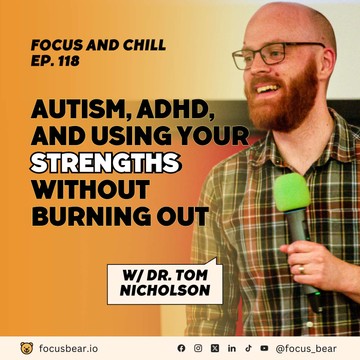
Dec 23, 2025 • 47min
Autism, ADHD, and Using Your Strengths Without Burning Out – Ep 118 with Dr Tom Nicholson
Burnout is your body telling you: stop. I’m going to make you stop.In this episode, Dr Tom Nicholson breaks down how productivity, overperformance, and even “success” can quietly become coping mechanisms that lead to burnout. Drawing from lived experience, academia, and clinical work, he explores how neurodivergent people can use their strengths without masking themselves into exhaustion.Dr Tom Nicholson is an assistant professor of mental health nursing, public speaker, and trainer specializing in neurodivergence and inclusion. He combines lived experience with clinical and academic expertise to help individuals and organizations rethink productivity, burnout, and sustainable ways of working.Episode Highlights 00:02:12 – Diagnosed with ADHD at five and labeled “the problem child” Dr Tom describes being diagnosed in the mid-1990s and quickly framed as disruptive rather than supported. Despite doing well academically, he internalized the message that effort and compliance mattered more than wellbeing, laying the groundwork for overworking later in life.00:03:37 – Discovering autism later in adulthood He explains diagnostic overshadowing and how ADHD became the explanation for every difficulty he had. Autism was missed entirely, even as he became a specialist himself, showing how easily burnout risks can be overlooked when people appear “high functioning.”00:06:08 – Reframing school trauma and constant effort With a later autism lens, Dr Tom revisits his school experiences and recognizes how much energy went into coping, masking, and adapting. This reframing helps explain why productivity and overperformance often feel compulsory rather than optional.00:17:30 – Productivity works in bursts, not all day Dr Tom explains that his productivity comes in intense, focused bursts followed by long recovery periods. Expecting steady, all-day output ignores how many neurodivergent brains actually function and pushes people into boom-and-bust cycles.00:25:23 – Early fatherhood collides with productivity culture He speaks candidly about sleep deprivation, routine collapse, and identity shifts during the first year of parenting. Hustle culture and productivity myths make this period far harder, especially for neurodivergent parents with high sensory and rest needs.00:32:36 – When productivity advice turns into self-punishment Dr Tom reflects on consuming large amounts of self-help and productivity content. Instead of helping, it reinforced the belief that he was never doing enough, turning tools into weapons for self-criticism rather than support.00:39:30 – Burnout as a forced stop After pushing through a PhD, lockdown, and a newborn, his body shut everything down. He describes burnout not as weakness, but as the body enforcing boundaries when the mind refuses to listen.00:44:59 – The question behind overworking The episode closes with a powerful reflection: much productivity is driven by old narratives and the need to prove something. Dr. Tom invites listeners to ask whether their drive comes from genuine values or from trying to outrun past judgments.Connect with Dr. Tom:LinkedIn: linkedin.com/in/dr-tom-nicholson-089727131Instagram: https://www.instagram.com/drtomnicholsonConnect with Jeremy:LinkedIn: https://linkedin.com/in/nageljeremyEmail: jeremy@focusbear.ioMore from Focus Bear:Website: https://focusbear.ioLinkedIn: https://www.linkedin.com/company/focus-bear/Youtube: https://www.youtube.com/@focusbearappTwitter: https://twitter.com/focusbear1
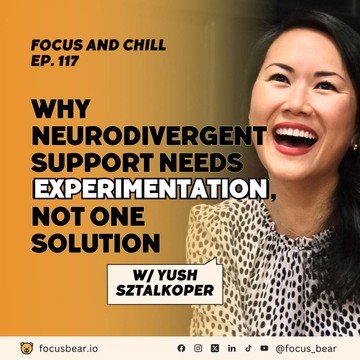
Dec 8, 2025 • 48min
AI, Biohacking, and Neurodivergence: Strategies that Actually Help – Ep 117 with Yush Sztalkoper
Understanding your neurodivergent brain isn’t about following one-size-fits-all solutions. In this episode, Yush Sztalkoper shares how experimentation, personalization, and a holistic approach helped her support herself and her neurodivergent children. From biohacking and genetics to AI tools that actually make daily life easier, this conversation explores what happens when you focus less on forcing outcomes and more on building systems that work for YOUR wiring.Yush is a neurodivergent entrepreneur, coach, and parent of a twice-exceptional child. She integrates positive intelligence, parenting experience, and individualized strategies to help neurodivergent people build sustainable emotional capacity, productivity, and regulation.Subscribe for more neurodivergent lived experiences, honest conversations, and strategies that actually help.Episode Highlights00:02:59 — Understanding biohacking for neurodivergent needs Yush explains that biohacking isn’t about supplements, but about understanding how your brain and body respond to lifestyle, environment, and support systems. She describes it as trial-and-error rooted in data rather than “one magic solution”.00:04:00 — One-size-fits-all approaches don’t work Many neurodivergent people try generic strategies and feel like they “failed” when nothing changes. Yush reframes this as insufficient solutions, not personal failure, and emphasizes individualized experimentation.00:09:30 — Dopamine and impulsivity explained Instead of treating impulsivity as a behavior issue, Yush and her naturopath looked at neurotransmitter pathways. Understanding dopamine differences helped them address impulsivity at the root, not just on the surface.00:10:30 — Small discoveries can drive big change A vitamin deficiency played a surprising role in her son’s impulsivity. By combining nutrition, lifestyle, and behavior support, they saw measurable changes in daily life.00:12:23 — Epigenetics as empowerment Yush shares how genetics and lifestyle interact, and how understanding these systems helps people make empowered choices without feeling destined to struggle. She reframes genetics as information, not limitation.00:19:21 — Using AI to maximize neurodivergent strengths AI becomes a cognitive amplifier, helping her process information faster, spot patterns, and make decisions with less overwhelm. She uses multiple tools depending on the task.00:22:30 — Parenting support through AI and gamification Yush uses AI creatively in parenting, turning overwhelming routines like cleaning into engaging, playful tasks. This shifts regulation and reduces stress at home.00:28:00 — Spotting blind spots with AI AI isn’t just practical; it helps her identify missing perspectives and stay curious about what she might be overlooking. This helps her adapt more quickly to challenges.00:33:52 — Harmful productivity advice Pushing through, forcing productivity, or “just powering through” can damage capacity and emotional regulation. Yush argues that protecting the nervous system matters more than finishing a task.00:41:55 — Executive function sprints in real life Her mornings are intense sensory and logistical routines requiring planning, flexibility, and capacity. She shows how executive functioning plays a central role in daily parenting.Connect with Yush:LinkedIn: https://www.linkedin.com/in/yushsztalkoper/Website: https://www.neurosparkplus.com/Connect with Jeremy:LinkedIn: https://linkedin.com/in/nageljeremyEmail: jeremy@focusbear.ioConnect with Joey:LinkedIn: https://www.linkedin.com/in/joeycorea/Newsletter: https://thepluckyjester.com/newsletter/More from Focus Bear:Website: https://focusbear.ioLinkedIn: https://www.linkedin.com/company/focus-bear/Youtube: https://www.youtube.com/@focusbearappTwitter: https://twitter.com/focusbear1Instagram: https://www.instagram.com/focus_bear/Facebook: https://www.facebook.com/focusbearapp/Podcast: https://podcast.focusbear.ioTiktok: https://www.tiktok.com/@focusbear
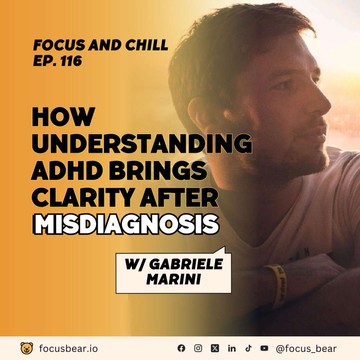
Dec 8, 2025 • 47min
ADHD Misdiagnosis in High Achievers: Gabriele Marini’s Story – Focus & Chill Ep 116
Gabriele Marini, a PhD researcher in computational linguistics, shares his journey with ADHD, revealing how his high IQ led to a misdiagnosis. He discusses the struggles of being a high achiever while dealing with ADHD, the cultural stigma he faced growing up in Italy, and how he rebuilt self-acceptance after understanding his neurodivergent brain. Gabriele also explores practical productivity strategies, including the importance of rest, managing anxiety, and creating focused work environments. His story highlights that ADHD and success can coexist.
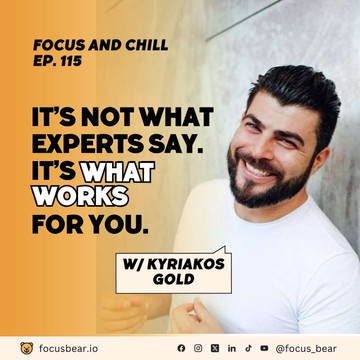
Nov 28, 2025 • 43min
Letting Go of Shame: Kyriakos Gold on Self-Acceptance & Identity – Ep 115
Kyriakos Gold, an autistic, queer Greek Australian social entrepreneur and founder of Just Gold, shares his empowering journey of unmasking after receiving an autism diagnosis in midlife. He discusses the emotional rollercoaster of revisiting past experiences and the liberating shift from shame to self-kindness. Kyriakos emphasizes rebuilding life around personal needs rather than societal expectations, creating a sensory-friendly environment, and using practical routines to foster well-being, all while advocating for neurodiversity and inclusion.
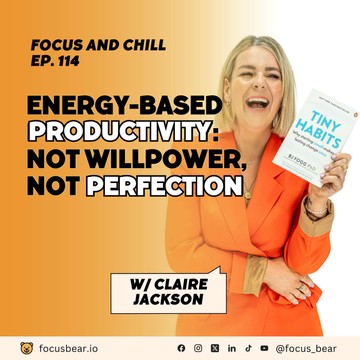
Nov 26, 2025 • 48min
Episode 114: How to Build Habits That Stick (Not Rely on Willpower) – Claire Jackson
Ever wonder why building habits feels easy one week and impossible the next?In this episode, Australia’s Chief Habits Officer Claire Jackson joins Jeremy and Joey to break down why willpower doesn’t work for neurodivergent brains or neurotypical brains—and how habits stick when they’re built around energy, compassion and real dopamine needs, not perfection.Claire opens up about her ADHD journey, motherhood, energy management, and practical rituals that made her home and work life calmer and more meaningful. From morning non-negotiables to dopamine-positive environments and the three-task rule, this episode blends science, lived experience, and real-world habit design.If you’ve ever tried to “just be more disciplined,” this conversation will feel like a breath of relief.🔍 Episode Highlights• [00:04:12] Why willpower doesn’t work for ADHD or neurotypical brains Habits collapse when they rely on self-control alone. Claire explains how dopamine, executive function and emotional load determine whether habits stick.• [00:09:00] Energy-based productivity instead of hustle or perfection Learn how to plan your day based on your internal “battery” instead of guilt, deadlines or pressure.• [00:14:30] Creating dopamine-positive environments Bright colours, sensory cues and physical spaces that feed your need for stimulation before unhealthy impulses kick in.• [00:27:37] The “three non-negotiables” habit rule A practical method for reducing overwhelm: three tasks count, everything else is optional.• [00:15:49] Rest as a productivity strategy — not a reward Why protecting the nervous system matters more for progress than grinding harder.• [00:12:55] Building identity-anchored habits Real change sticks when habits reinforce: “I matter, and this action proves it.”• [00:17:33] Compassion over perfection Success isn’t “never missing a habit” — it’s knowing what to return to when life gets messy.• [00:18:58] Designing a life that feels good for you Claire shares how she now builds routines, parenting systems and work rhythms based on values, energy and lived experience.Connect with Claire:LinkedIn: https://www.linkedin.com/in/claire-jackson-5635592bWebsite: https://thehabitlab.com.au/Connect with Jeremy:LinkedIn: https://linkedin.com/in/nageljeremyEmail: jeremy@focusbear.ioConnect with Joey:LinkedIn: https://www.linkedin.com/in/joeycorea/Newsletter: https://thepluckyjester.com/newsletter/More from Focus Bear:Website: https://focusbear.ioLinkedIn: https://www.linkedin.com/company/focus-bear/Youtube: https://www.youtube.com/@focusbearappTwitter: https://twitter.com/focusbear1Instagram: https://www.instagram.com/focus_bear/Facebook: https://www.facebook.com/focusbearapp/Podcast: https://podcast.focusbear.ioTiktok: https://www.tiktok.com/@focusbear
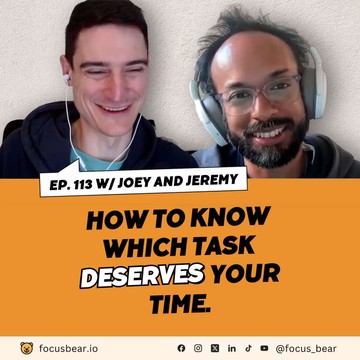
Nov 12, 2025 • 38min
Episode 113: How to Prioritize Tasks and Stay Focused | Productivity Tips from Jeremy & Joey – Ep 113
Struggling to prioritize tasks? Discover practical frameworks like RICE and UICE to help clarify your decisions. Jeremy and Joey explore the balance of urgency and importance, emphasizing the power of small experiments to cut through uncertainty. They debate adding joy to prioritization, share innovative ways to organize reading lists, and discuss how AI impacts productivity. Get insights on maintaining coding skills in an era of automation and techniques to enhance focus without the fluff.
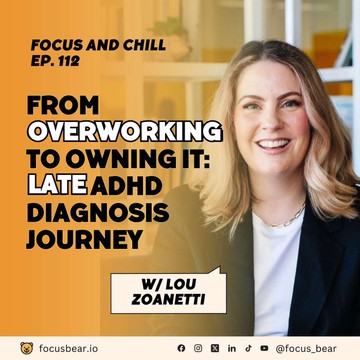
Nov 10, 2025 • 50min
Episode 112: Late ADHD Diagnosis, Parenting & Productivity with Lou Zoanetti
Lou Zoanetti, CEO of Brightworks, shares her journey of discovering her late ADHD diagnosis. Inspired by her son’s autism diagnosis, she reflects on the validation and heartache of understanding her lifelong struggles. Lou discusses productivity hacks she used, including deadlines and structured environments, revealing how ADHD coaching helped reshape her work-life balance. She highlights the strengths ADHD brings, like creativity and energy, and explores how generative AI is transforming early career hiring.
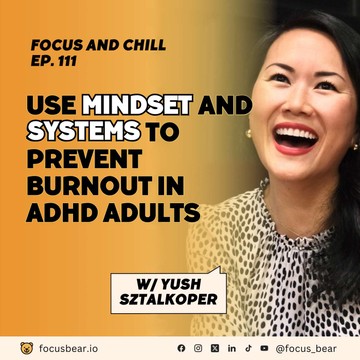
Nov 1, 2025 • 49min
Episode 111: Yush Sztalkoper
Welcome to episode #111! We’re thrilled to be joined by Yush Sztalkoper. Yush Sztalkoper is a neurodivergent entrepreneur, coach and founder of Neuros Spark Plus. She works with parents of twice-exceptional children and with organizations to build neuro-inclusive cultures. Yush uses a positive intelligence approach to reshape self-sabotaging habits, reduce burnout and create support systems that fit neurodivergent brains.Q&A JN: How did your journey into neurodiversity start? – Began with concerns for her son at age four and a half, which led to investigation and support. – Her son is twice-exceptional - bright with learning differences. – Her child’s profile sparked reflection and ultimately her own ADHD diagnosis about a year ago. – Diagnosis brought clarity and permission to seek different supports.JN: What changed after your diagnosis? – Greater self-awareness and reduced guilt about needing supports. – Shift from deficit thinking to strength-based perspective. – Left corporate role two months after diagnosis to pursue more fitting work.JN: How did culture and immigrant background shape your masking? – Asian immigrant upbringing encouraged fitting in and masking differences. – Masking led to long-term adaptation and people-pleasing strategies. – Parenting revealed those patterns and forced new choices.JN: What is Positive Intelligence and how does it help? – A mindset method that identifies saboteurs and activates “sage” responses. – Uses Activate and Empathy sages to ask “What is needed now?” and to give self-compassion. – Helps shift victim thinking to opportunity-focused thinking for parenting and work.JN: How do ADHD traits show up for you and your son? – Time blindness, hyperfocus, intense interests, and masking differences. – Rejection sensitivity and people-pleasing were major personal drivers. – Hyperfocus can be an asset when channeled correctly.JN: Why move from corporate to entrepreneur? – Corporate expectations blocked expression of core strengths. – Needed autonomy, flexibility and roles that let creativity and novelty thrive. – Now builds services and community that scale human-centered support.JC: How are you scaling your work? – Local monthly in-person sessions for parents - created a nonprofit community hub. – Neuros Spark Plus grew to offer coaching, small cohort programs and organizational consulting. – Partnership model - Collab X - to amplify experts and scale impact beyond local reach.JN: What does neuro-inclusive work look like in organizations? – Help leaders co-create supports and build environments where masking is unnecessary. – Teach self-advocacy skills so workers can express needs and leaders can listen. – Focus on holistic supports across life stages, not siloed programs.JC: How do you approach productivity for neurodivergent clients? – Start with mindset - use Positive Intelligence to ask “What is needed now?” – Laser focus on one actionable task rather than a long, stress-inducing to-do list. – Build breaks, self-empathy and flexibility into routines to avoid burnout.JN: Final ask or message? – Lean into strengths and build systems that fit your brain. – Early support prevents prolonged struggle - advocate for neuro-inclusion and shared community resources.Connect with Yush:LinkedIn: https://www.linkedin.com/in/yushsztalkoper/Website: https://www.neurosparkplus.com/Connect with Jeremy:LinkedIn: https://linkedin.com/in/nageljeremyEmail: jeremy@focusbear.ioConnect with Joey:LinkedIn: https://www.linkedin.com/in/joeycorea/Newsletter: https://thepluckyjester.com/newsletter/More from Focus Bear:Website: https://focusbear.ioLinkedIn: https://www.linkedin.com/company/focus-bear/Youtube: https://www.youtube.com/@focusbearappTwitter: https://twitter.com/focusbear1Instagram: https://www.instagram.com/focus_bear/Facebook: https://www.facebook.com/focusbearapp/Podcast: https://podcast.focusbear.ioTiktok: https://www.tiktok.com/@focusbear
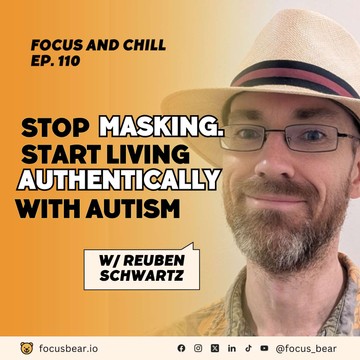
Oct 31, 2025 • 38min
Episode 110: Reuben Schwartz
Welcome to episode #110! We’re thrilled to be joined by Reuben SchwartzIn this episode, startup consultant Reuben Schwartz shares his late autism diagnosis journey, revealing how it reshaped his approach to parenting, burnout, and productivity. From building and selling a startup to navigating fatherhood and sensory overload, Reuben gets real about what it means to thrive as a neurodivergent professional in a world built for neurotypicals. Perfect for anyone exploring ADHD, autism, neurodiversity, and sustainable productivity.Q&AJN: What was it like learning you were autistic after 45 years? – Other people suspected before he did – Diagnosis brought clarity and made sense of lifelong confusion – Helped him understand why social interactions and routines mattered so much – Learning to accept differences instead of judging right or wrongJN: How does being “high moralistic, low masking” affect you? – Sees ethical questions everywhere, even daily choices – Feels there’s one “correct” way to do things – Now accepts that others think differently, improving relationships – Aware now of signals he used to missJC: How has autism shaped your relationships and parenting? – Struggles with emotional understanding and flexibility – Finds parenting extremely demanding and draining – Needs solitude to recharge, leading to burnout after becoming a father – Realized he once followed societal expectations (“become a normal horse”) instead of knowing himselfJN: You’ve had 13 careers and built a startup. What have you learned from that? – Obsessiveness can be both a gift and a trap – Works best with structure or collaborators who balance his intensity – Many “failures” taught him more than successes – Now values accepting his limits and building support systemsJC: How do you manage burnout and productivity now? – Uses GTD (Getting Things Done) system religiously – Writes down everything to clear mental load – Avoids email and messages in the morning – Uses color-coded planning and strict scheduling – Takes regular breaks (with Focus Bear app reminders) – Wears a fedora to manage sensory sensitivity to lightJN: What doesn’t work for you? – “Do it until it’s done” startup mentality – Eisenhower Matrix felt too abstract – Sleep deprivation immediately destroys focus and composureJC: Tell us about your current projects. – Consulting for startups and mentoring founders – Writing new children’s books – Researching misinformation and how to rebuild empathy in digital spaces – Exploring ways to reduce online certainty and polarizationJN: Final message for neurodivergent listeners? – Self-knowledge matters more than fitting in – Your brain works differently, not worse – Build systems that suit you rather than forcing someone else’s modelConnect with Reuben:LinkedIn: https://www.linkedin.com/in/reubenschwarz/Connect with Jeremy:LinkedIn: https://linkedin.com/in/nageljeremyEmail: jeremy@focusbear.ioConnect with Joey:LinkedIn: https://www.linkedin.com/in/joeycorea/Newsletter: https://thepluckyjester.com/newsletter/More from Focus Bear:Website: https://focusbear.ioLinkedIn: https://www.linkedin.com/company/focus-bear/Youtube: https://www.youtube.com/@focusbearappTwitter: https://twitter.com/focusbear1Instagram: https://www.instagram.com/focus_bear/Facebook: https://www.facebook.com/focusbearapp/Podcast: https://podcast.focusbear.ioTiktok: https://www.tiktok.com/@focusbear
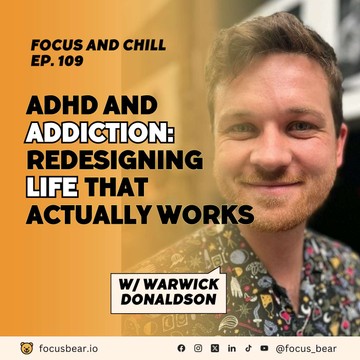
Oct 29, 2025 • 44min
Episode 109: Warwick Donaldson
Welcome to episode #109! We’re thrilled to be joined by Warwick Donaldson.Warwick Donaldson is the founder and managing director of CapXcentric, a startup consultancy helping founders raise capital with clarity and confidence. After discovering his ADHD in his early thirties, Warwick learned that what once looked like chaos was actually a different kind of focus. Now clean, sober, and running his own business, he’s building a life that works with his brain instead of against it.JN: When did you realize you weren’t neurotypical? – Diagnosis came only a few years ago after a social worker date casually asked if he had ADHD – Spent months reflecting, researching, and taking online ADHD assessments – Finally found an affordable psychiatrist who confirmed the diagnosis – Realized his lifelong intensity and impulsivity now made senseJN: How did the diagnosis change your life? – Radically improved clarity and self-understanding – Medication (Vyvanse) helped reduce impulsivity and emotional volatility – Therapy helped unpack years of negative self-beliefs from being “the difficult kid” – Gained tools for self-compassion and communicationJC: What traits stood out as signs of ADHD? – Impulsivity, addictive behaviors, and intense hyperfocus – Addicted to stimulation: partying, smoking, and long techno nights – Difficulty with emotional regulation and rejection sensitivity – Persistent drive and energy — a blessing and curseJN: How did this affect your career path? – Worked in finance, startups, and tech; 13 years across multiple roles – Never lasted long in one job — realized novelty drives motivation – Now runs his own startup consultancy, designed around his ADHD rhythm – Focuses on early-stage founders and capital raises where variety and chaos thriveJC: What changed after you started working for yourself? – Finally able to drop the mask and be authentic – Created “CapXcentric” as a brand that reflects his true personality – Most of his clients also have ADHD, creating mutual understanding and trust – Learnt to stop pretending to fit conventional corporate moldsJN: How do you manage focus and prevent burnout now? – No alcohol, drugs, or cigarettes for over two years – Strict work boundaries: 8 AM to 6 PM only, no weekends – Regular walks, gardening, and phone-free mornings – Clear routines and environmental design (no phones in the bedroom, pill boxes next to coffee)JC: How did sobriety change your life? – Forced him to face unresolved issues without escape – Deepened family and partner relationships – Helped rediscover interests outside work – Built real hobbies — gardening, cooking, reconnecting with natureJN: How do you balance your work in a “hustle culture” industry? – Rejects constant-availability culture in startups – Sets firm client boundaries and communicates expectations clearly – Believes productivity comes from structure, not endless hours – “People will adapt faster than you think when you stop replying at midnight.”JC: What’s your advice for others with ADHD? – “Lean into who you are instead of fighting it.” – Design your life around your wiring, not society’s expectations – Self-acceptance is a practice, not a finish line – The earlier you start, the easier life becomesConnect with Warwick:LinkedIn: https://www.linkedin.com/in/warwickdonaldson/Website: https://www.capxcentric.com/Connect with Jeremy:LinkedIn: https://linkedin.com/in/nageljeremyEmail: jeremy@focusbear.ioConnect with Joey:LinkedIn: https://www.linkedin.com/in/joeycorea/Newsletter: https://thepluckyjester.com/newsletter/More from Focus Bear:Website: https://focusbear.ioLinkedIn: https://www.linkedin.com/company/focus-bear/Youtube: https://www.youtube.com/@focusbearappTwitter: https://twitter.com/focusbear1Instagram: https://www.instagram.com/focus_bear/Facebook: https://www.facebook.com/focusbearapp/Podcast: https://podcast.focusbear.ioTiktok: https://www.tiktok.com/@focusbear


